Universal Reward Protocol ICO Review
Details
Token Symbol: URP
Crowdsale Token Price: €0.10
Hard Cap: €20,000,000
Maximum market cap at ICO on a fully diluted basis: €50,000,000
Total Tokens for Sale: 240,000,000 (40% of Total Supply)
Token Sale Date: TBA
What is Universal Reward Protocol?
Universal Reward Protocol aims to disrupt the retail industry by bridging the gap between online and offline commerce, and providing both consumers and retailers with new incentives and benefits that enable a deeper, more consistent interaction between the two parties. The protocol will enable brick and mortar retailers to gain access to insights about their visitors’ behaviour, tastes and preferences in a similar way to leading websites such as Amazon or Alibaba.At the same time, Universal Reward Protocol allows all retailers to reward their customers for any type of shopping behaviour, and for sharing their corresponding Proof-of-Behaviour (PoB) data with the retailer. Crucially, Universal Reward Protocol enables any retailer to join the blockchain-based network and create reward campaigns using smart contracts while granting shoppers full control and security of their data. By accepting to share their shopping behaviour data with the network, shoppers earn URP tokens, while the data is used by retailers to build redemption offers that best suit each customers needs.Retailers and brands will interact with a single component: the Campaign Manager, which is subdivided into two symmetric interfaces, the Reward Campaign Manager and the Redemption Campaign Manager. These allow retailers to define campaigns aimed at enhancing Key Performance Indicators and to publish personalized offers. Shoppers will interact with the Profile Manager component directly on their mobile device, which allows them to check their URP token balances, consent to taking part in select campaigns, and to monitor and update the list of available reward campaigns, along with their personal privacy settings.Rewarding a shopper through URP consists of a series of 8 steps and after the process has been completed, the shopper can choose to redeem their tokens with the same retailer, or any other within the network, through a personalized offer that the retailer created based on the collected PoB data.Four categories of participants will take part in the URP network, these include:
- Rewarders are retailers or brands which create marketing campaigns on URP to reward shoppers’ behaviours.
- Oracles are systems facilitating the share of information between the blockchain and the real world, by verifying that shoppers’ behaviour fulfils a marketing campaign’s conditions in order to call the Smart Contracts which will then release tokens.
- Shoppers are individuals who participate in reward campaigns on the Universal Reward Protocol and consequently earn URP tokens.
- Redeemers are retailers or brands which create marketing campaigns or URP redeem offers.
In addition to shoppers and retailers/brands, the URP ecosystem will also be composed of applications built on top of the protocol that will allow interaction with shoppers and the gathering of PoB data. The protocol will be launched with a first application built on it, OCCI, which allows retailers to identify and analyze a visitor’s in store shopping path, which can be monitored and completed by all applications interested in joining the ecosystem.
Product
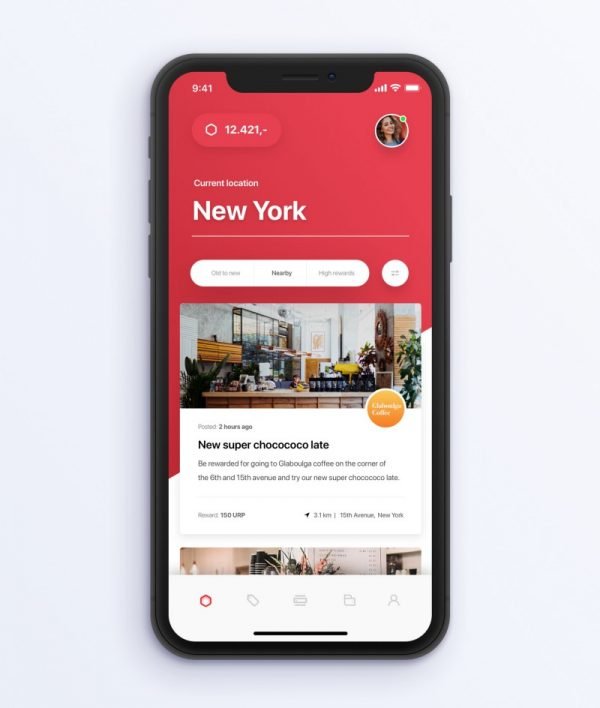
75%
Product Readiness
Work on the project began in 2015 when members of the core team began developing the Occi solution, and the Proof of Concept was realised in 2016, when the first Auchan store was equipped with IoT sensors. The team are focused on developing aspects of the URP protocol over both 2018, and 2019, and while the Occi solution is market ready, they will release an Alpha of URP, with Proof-of-Behaviour specifications in Q4 2018. Q2 of 2019 will see the mainnet release and the launch of the shopper app on application stores.
Space in the Market & Competitive Landscape
A number of projects are working towards disrupting the retail world through the incorporation of blockchain technology, and these include Nucleus Vision, Shopin, and Carry Protocol. In addition, projects such as CyberMiles and Omnitude are providing blockchain solutions for ecommerce and Universal Reward Protocol is also competing with traditional reward programs applications like Shopkick and analytics solutions for retailers like RetailNext.Competitors’ valuations:
- CyberMiles, valued $75M.
- Shopin, raised $50M.
- Nucleus Vision, valued $40M.
- Omnitude, valued $25M.
- Carry Protocol, raised $19M.
Universal Reward Protocol aims to gain an advantage over projects such as Nucleus Vision as it is a rewarding protocol and not a dApp. By extension, any retailer, shopper and dApp can participate in URP and the Universal Reward Protocol team is already working with major retailers worldwide in order to solidify a competitive advantage in terms of business expansion.
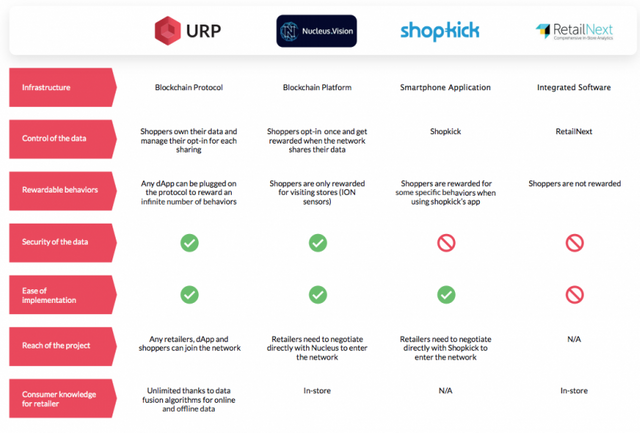
Size of Potential Market
The URP team are aiming to disrupt the brick and mortar retail industry and have identified the reward sector, which costs grocery retailers more than $20 billion a year as a key area.In addition, they stipulate that 90% of all retail sales worldwide are still accounted for by physical sales and they have targeted major retailers based in France in order to gain adoption of the Occi solution and URP protocol. These include Auchan, Carrefour, and Galeries Lafayette, and over 350,000 shoppers have already been identified with over 10 million shopping visits logged. This highlights that while limited to one industry, the scope of the project in terms of revenue generation is huge.
Innovation & Intellectual Property
The team have filed two patents on proprietary algorithms (FR1656748 and FR1654618), however, they plan to operate as an open source project and make their source code publicly available.

Use of Blockchain
95%
Blockchain Advantage
The team outline that incentivization is the focus of the protocol, and as the goal of the system is to allow retailers to define economic incentives for individual shoppers to accomplish certain behaviours, then blockchain technology provides the perfect base to enable a trustless and fair reward network.
Need for Custom Token
Retailers offer URP tokens as an incentive for shoppers to interact in a desired way, and use the collected data regarding behaviour to tailor personalized offers through which the shoppers redeem their tokens. In addition, URP will be used as incentive for all stakeholders to behave correctly, and to help prevent fraud and secure the network. It will also be used to organize protocol governance.
Precautionary Measures
The team have chosen to develop the Universal Reward Protocol as a sidechain fully pegged to the public Ethereum network. By using Ethereum as a base layer, sidechain assets can have the security guarantees of the public Ethereum network while also being able to incorporate differing consensus mechanisms.They have also developed a curation mechanism, where curators are rewarded with URP tokens for correctly vetting viable contracts and refusing invalid ones. This helps to prevent the publication of a Reward Contract with incompatible conditions that makes it impossible for any shopper to fulfil it, and wastes the network’s resources. In order to publish a Reward or Redemption contract, an URP token stake will be put in the contract balance as collateral by the retailer. If the contract is deemed invalid, this stake will be lost by the retailer and transferred entirely to the curators. In addition, dApps wishing to connect to the protocol and provide smart contracts with Proof-of-behaviour will offer up URP as collateral, which is lost if the oracle cannot confirm the origin of the proof of behaviour. This protects the network from hostile dApps trying to have a Reward Contract release tokens to an address that hasn’t fulfilled the targeted behaviour.
Decentralization
The URP System will adjust the governance of the sidechain by allowing anyone to run a node, and this shared governance will be facilitated by an algorithm that works to punish and censor dishonest nodes. There are three main categories of participants who are expected to run nodes, these include:
- Rewarders & redeemers: They will run their own nodes in order to follow the activity on the network without relying on third parties.
- Oracles: These technology service providers, will be more tech savvy than rewarders & redeemers, and will run a node to track the network activity and ensure their fees are being correctly paid.
- External actors: A proper incentivization model might be implemented to attract external actors to become validators, in order to maintain and improve network security by promoting decentralization.
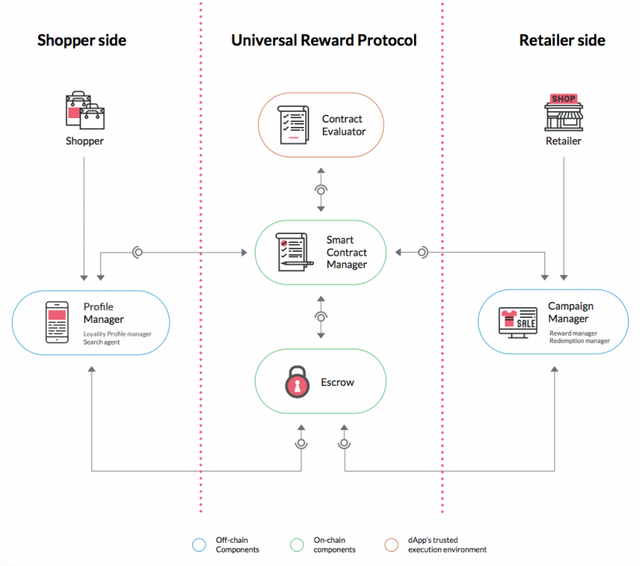
Storage and/or Mining
The Ethereum mainnet currently utilizes a proof-of-work mechanism, while the sidechain, will use Proof of Authority, with sees each validator get an assigned time slot in which they can release a block. The time slots are determined by the system clock of each validator. The team also concede that the consensus algorithm on the sidechain will follow the trend of innovation on Ethereum’s’ Proof of Stake model, and may incorporate Casper FFG and Casper CBC.
Contribution for the Blockchain Economy
The retail industry has principally been targeted by blockchain projects aiming to improve supply chain mechanisms and safeguard consumer purchases. However, due to the size and global reach of the retail industry, it remains a major sector that allows more ambitious projects to make a significant contribution by addressing issues such as user data protection, and retailer and consumer relationships. The Universal Reward Protocol team will be able to contribute significantly to the blockchain economy by ensuring their protocol gains widespread adoption and is able to support dApps processing the interactions and behaviours of shoppers well into the millions.
Documentation
70%
Comprehensiveness
The documentation provided by the Universal Reward Protocol’s team is well detailed and extremely comprehensive. The whitepaper is presented as a 54 page document and is supplemented by a 15 page lightpaper, a technical whitepaper, and a one page document. The combination of documents outlines the key aspects of the project including the background, the current issues concerning the retail industry, and USP’s solution.The team also clearly outline the technology that supports the project, and covers the core founders and advisors. It also includes an extensive roadmap, information on the token sale and use of funds, and a section of disclaimers. An easy to read business plan is missing, however, the team do outline their current partnerships and aims to develop adoption of their protocol across the retail industry.
Readability
The language and structure found in all the documents is generally easy to understand, and the ideas and concepts explained should be grasped quite easily by the majority of readers. The various documents are laid out very well and also include illustrations and diagrams that help to clarify key concepts and processes.
Transparency
The whitepaper covers the methodology behind the project, and technological solutions in great detail. In addition, core team members and advisors are listed in addition to the token metrics and a number of legal disclaimers which greatly increases the project’s transparency.
Technology
The whitepaper spends a good amount of time explaining the protocol in detail and covers retailer-side components such as the redemption campaign manager and shopper-side components such as smart contracts management. The whitepaper also covers the structure of dApps on the protocol and the key Occi dApp, IoT and AI stack for in-store intelligence in good detail. The technical whitepaper also covers key protocol features such as consensus, governance, security, and privacy.
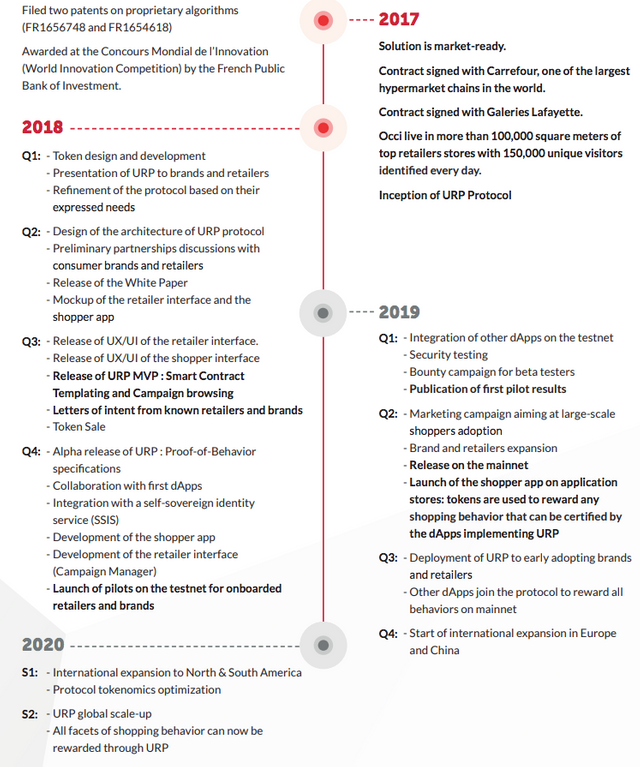
Development Roadmap
65%
Concreteness
The team have provided an extensive roadmap that dates back to 2015 when the company was launched and the Occi solution was developed. Since then, the team have signed a partnership with Auchan, a leading distribution groups and developed their proof of concept, and equipped Auchan stores with IoT sensors. The solution is market-ready and further contracts have been signed with industry leaders Carrefour, and Galeries Lafayette. Over the course of 2018 the team will be adjusting the design of the architecture of URP protocol and the release of the URP MVP with Smart Contract Templating and Campaign browsing is set for Q3 2018 while an Alpha release is set for Q4 2018.
Feasibility
The team should be able to keep up with their roadmap, as a significant amount of development has already taken place. With a number of important partnerships already in place alongside a working solution, much will also depend on the team’s marketing drive and ability to draw attention to URP and effectively onboard customers and retailers.
Vision
The team are mainly focussed on developing the design of the architecture of URP protocol and releasing their Alpha at the end of 2018. Once this has taken place, the team are also set to ramp up their marketing efforts and expand into markets across Europe, Asia, and North and South America.
Maturity
The roadmap dates back to 2015 and runs until 2020, and the team are currently working on developing the URP MVP with Smart Contract Templating and Campaign, while the URP Alpha should be ready by the end of this year.
Business Model
60%The team does not include a strict business plan, however, the white paper clearly shows that they are planning to develop a blockchain that supports an ecosystem of dApps that produce Proof-of-Behaviours and encompasses all aspects of the interactions between shoppers, retailers and brands. Examples of this include:
- In-store activity to increase traffic and acquire new customers.
- Social media analysis to reward brand influencers and shopper engagement.
- Web 3.0 navigation to incentivize conversions in recurrent website visitors.
- Supply chain integration to reward shopper participation in last-mile delivery.
By revolutionizing the shopping experience, the URP team aim to carve out a significant share of the retail market and generate recurring business via retailers, brands, and consumers.
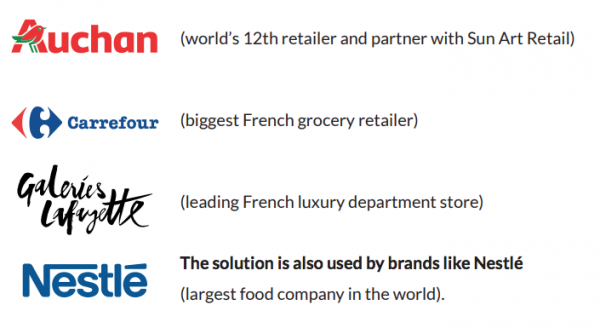
Concreteness & Feasibility
The project is rather impressive in terms of achievements and important contracts have already been secured with leading retail organizations such as Auchan, Carrefour, and Galeries Lafayette. In addition, the team have the working Occi solution that is already being deployed by their partner organizations. Over the next year, the URP protocol will be rolled out and deployed by an increasing number of retailers and the team have already developed a secure base from which they can launch the URP protocol. While it may be difficult to guarantee consumer adoption, it can be expected that the protocol will be given a good chance to succeed.
Clarity
The team outline their vision to revolutionize the shopping experience, and bring about a new era of consumer friendly, data-driven retail, which respects shoppers’ privacy and taps into the potential of individual marketing. Crucially, the team also detail their plans to conduct a marketing campaign aimed at large-scale shopper adoption, as well as expanding their network of brand and retailers. After developing a strong base in France, they also plan to expand across Europe and China in 2019, before going on to expand across North and South America in 2020.

Cost Effectiveness
The hard cap of €20 million makes this a well valued project in terms of its direct competition, and the team have fully outlined their token metrics with 40% of token are being made available to the public, and a further 40% will be held in reserve and/or used for incentives and rewarding subcontractors. This is important as the team will need to allocate a significant amount of resources to marketing URP and incentivizing retailers, brands, and consumers to adopt their solutions. They also declare that a minimum of €500k (rising to €1.7 million and €1.2 million respectively) will be allocated to both Sales and Marketing and Product Development every year up to 2022.
Legitimacy
The project is based in Paris, France and has been in operation since 2015. The company is registered in France as Occi and holds two patents on proprietary algorithms (FR1656748 and FR1654618). It has also entered into partnerships with well respected multinationals and both the core team and advisory board have academic and professional records that are easily verifiable.
Compliance
This section is not included in the rating. Regulations and compliance matters are two very sensitive topics which we have realized cannot be quantified as of now. This should of course always be taken into consideration when analyzing a project.
Intrinsic Value of Token
The URP token acts as a standard ERC-20 utility token and has a dual function:
- Retailers will distribute URP tokens to reward shoppers based on rules of their own choosing. While shoppers will redeem their URP tokens in exchange for discounts, gifts or premium services.
- The URP token will also be used as an incentive for all stakeholders to behave correctly, and help prevent fraud and secure the network.
In order to publish a Reward or Redemption contract, an URP token stake will be put in the contract balance as collateral by the retailer. If the contract is deemed invalid, this stake will be lost by the retailer and transferred entirely to the curators. In addition, any dApp wishing to connect to the protocol and to provide smart contracts with Proof-of-behaviour will put up an URP stake as collateral, which will be lost if the oracle is unable to confirm the origin of the proof of behaviour.
Financial Security Consideration
The team mention that the URP Token acts as a standard ERC-20 token and that the purchase of URP Tokens shall not be construed as investment or the purchase of a financial product.
Adherence to Regulations
The team appear to be committed to working within the current regulatory frameworks and have included a variety of disclaimers in their whitepaper. They are clearly aiming to run a legally compliant token sale and declare that only Eligible Purchasers as listed in the terms and conditions of the sale are allowed to purchase URP Tokens during or following the Token sale. In addition, individuals acting on a non-professional basis as a simple consumer (within the meaning of the EU Directive 2011/83/EU on consumer rights) and persons (including legal entities) considered as “U.S. Person” (within the meaning of “Regulation S” of the Securities Act of 1933) are excluded from the URP Token sale.They have also included a provision for a minimal URP stake to be kept on each shopper’s wallet to finance the Data Protection Contract execution in case they wish to edit or remove their consent to a campaign, in compliance with GDPR regulation.
Legal Review
The URP team still needs to confirm the legal advisors they are working with, but they include a number of disclaimers that clearly outline the legal issues connected to their token sale. Potential investors are directed to Schedule A of the terms and conditions of sale in order to familiarize themselves with the risk factors described.Update on 28 August, 2018: The team have reached out to us and it turns out Universal Reward Protocol is backed by one of the largest American law firms that operate worldwide (founded in 1949).
Company & Team
85%The team is currently made up of approximately ten people, and the members combine their experience in Engineering, Business, and Marketing. The team is academically gifted and generally well balanced although it is quite young in terms of both age and work experience, as a result it is expected that they will call on the knowledge provided by their advisors.
Company Stage
The Occi company is registered in France and retains an address at 11 Rue Saint Didier, 75116 Paris. The enterprise has been in operation since 2015 and holds patents on proprietary algorithms. The core team members are also based in France and have entered into partnerships with Auchan, Carrefour, and Galeries Lafayette.
Founders
Yves Benchimol (Co-founder/CEO) – Holds a Master’s Degree in Entrepreneurship from UC Berkeley School and an MSc in Applied Mathematics IT and Entrepreneurship from Ecole Polytechnique. He is currently the CEO of Occi and has experience as a software engineer at Jive and as an engineering intern at Dassault Falcon Jet.Louis Millon (Co-founder/CTO) – Holds a Master’s Degree in Industrial Engineering and Operations Research from UC Berkeley and an MSc in Applied Mathematics and Entrepreneurship from Ecole Polytechnique. He is the current CTO of Occi and has experience of working at Parrot and Autolib in France as a drone technical consultant and a junior consultant.
Advisory Board
There are currently seven advisors consulting with the project and these include François Poupard, the Former Head of Innovation at Auchan Retail, and Samuel Baroukh, the Head of eBusiness at Nestlé France. Jeremy Bokobza the Lead Developer at Stratis also holds an advisory position as does Laurent El Ghaoui a Professor in EECS at UC Berkeley. Thibault de Vésinne-Larüe, a Venture Architect at BCG Digital Ventures, and Deepak Gulati the CEO and CIO at Argentière investment firm have also taken up advisory roles.
Blockchain & Development Talent
Enguerrand Pelletier works as a software engineer on the project and brings across his experience of working at Occi since 2015. He has worked in both back-end and front-end development and brings his expertise in Python, Scala (Akka), and NodeJS (ES6). He has also worked as a software developer at Datexim in France, and is currently a lead engineer at Memento, which is a computer vision based platform that automates the distribution of photos.
Business Talent
Thomas Wolf acts as COO and is an experienced operator in the business world with over twenty years experience. He is currently President at Anza, and prior to this was the COO at Budgetbox and the CEO/owner of SOGEC Marketing. He also served as the CEO France and Regional Director Europe at Catalina marketing, which is a world leader in digital couponing with the largest global database of shopper purchase history.
Legal Counsel
Universal Reward Protocol have yet to confirm the legal entities they are choosing to consult with.
Superstar
Yves Benchimol
CEO / Co-founderHe has an MSc. from Ecole Polytechnique (1st Engineering School in France) and a Master in Entrepreneurship from UC Berkeley.
Previously he worked at Jive as a Leader in task management market, and at Dassault Falcon Jet; with both positions being internships. In 2015 he Founded Occi.io – Occi enables physical stores to access previously untapped data about what shoppers do inside the store.
Token Sale
90%
Minimum / Maximum Amount to Raise
Universal Reward Protocol has a hard cap of €20 million and a soft cap of €5 million.For Private Sale (€5 million cap) contributors, the bonus tokens will have a vesting period of 6 months starting 30 days after the reception of the main token stake.
For Pre-Sale (€10 million cap) contributors, the bonus tokens will have a vesting period 4 months starting 30 days after the reception of the main token stakeThe fact that both private sale and pre-sale investors have decent vesting periods, mitigates the risk of crowdsale participants to be dumped on.
Fund Allocation
The proceeds from the tokens for sale are intended to be used to support and develop the project and the team have outlined exactly how funds will be allocated between 2018 and 2022.A total of 600,000,000 URP Tokens will be issued with 240,000,000 being made available during the token sale; the allocation and use of tokens will be as follows:
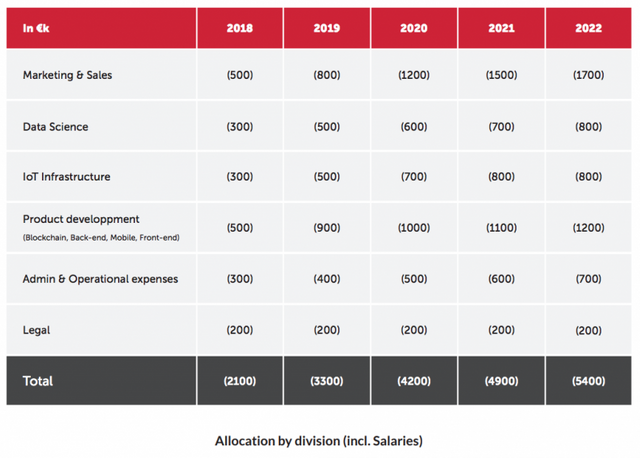
Token Sold-Kept-Ratio
- Proportion of Tokens for Sale 40%
- Reserve 35%
- Founding team 15%
- Advisors 5%
- Incentive Program and Subcontractors 5%
Quality of Campaign Strategy
The team have operated a very transparent strategy so far with a good amount of detailed information regarding the team, token metrics, and token sale being made available to the public. The project is still somewhat under the radar and it is expected that the team will soon ramp up their campaign marketing strategy in order to improve their visibility.
Hype Factor
This section is not included in the rating. Hype is something that constantly changes and is too subjective to include in the rating. However, we do feel that it is important to consider it when analyzing a project. The project still has to develop a significant level of hype and the URP Telegram channel has just under 10,000 members, and their Twitter account has just over 1,000 followers. This highlights that there is still work to do to develop their social media presence and attract potential investors and stakeholders.
Final Conclusion
Product | 75%Use of Blockchain | 80%Documentation | 90%Development Roadmap | 90%Business Model | 70%Company & Team | 75%Token Sale | 85%Final Rating | 81%
Universal Reward Protocol is definitely a strong ICO project and has made serious strides in terms of both technological and business development. The URP team brings a considerable amount of quantifiable results to the table and set themselves apart from the majority of ICOs as a result. The development and successful deployment of the Occi solution alongside entering into working partnerships with multibillion European corporations such as Auchan, Carrefour, Galeries Lafayette, and Nestle is impressive. However, as with any blockchain project there are areas of concern, firstly the team is still relatively young and inexperienced in the business world with a number of team members in the process of building impressive employment histories. Also URP operates in one of the less attractive sectors of the blockchain as far as investors are concerned and lags behind high throughput blockchains, exchanges, and artificial intelligence projects in terms of marketability. This is evidenced by the relatively low valuations of its competitors and the team will have to work hard to attract revenues and ensure that a significant amount of value is retained throughout their ecosystem. Furthermore, if the team do reach their hard cap they need to have good finance-management post-ICO in order to avoid over-spending and bankruptcy.
Most importantly, the team’s impressive achievements do not guarantee that URP will be intrinsically valuable out of the gate as the token has little use for most purchasers outside of pure speculation. However, the team appears to have anticipated this and have incorporated a number of lock ups into their token sale. Private sale participants receive a 40% bonus attached to a vesting period of 6 months which starts 30 days after the reception of the main token stake, while Pre-sale participants receive bonuses of 25% to 15% and see their tokens being vested for 4 months starting 30 days after the main token stake.
In addition, the advisors’ tokens are locked for 12 months, while the founding team’s tokens are locked for 2 years, and the reserve tokens are split with 50% in 12 months lock-up, and 50% in 24 months lock-up. These conditions are designed to give URP a good level of resilience immediately after the token sale, however, this project still best suits the long term investor, and without a large amount of hype, the project may not attract a large quantity of retail investor funding or trading activity on the secondary markets.
As a result the team will be forced to aggressively drum up adoption and the 35% of tokens held in reserve will be used to lower acquisition costs for new retailers and brands as well as help to gain traction by rewarding any early adopters. URP should prove interesting for anyone looking for a longer-term project to participate in, or anyone with a stronger interest in the retail industry, also any unsold tokens will be reallocated to all buyers who participated in the token sale proportionally to their initial stake which is an extra bonus for token sale participants.
Welcome to the Future -> https://rewardprotocol.com/